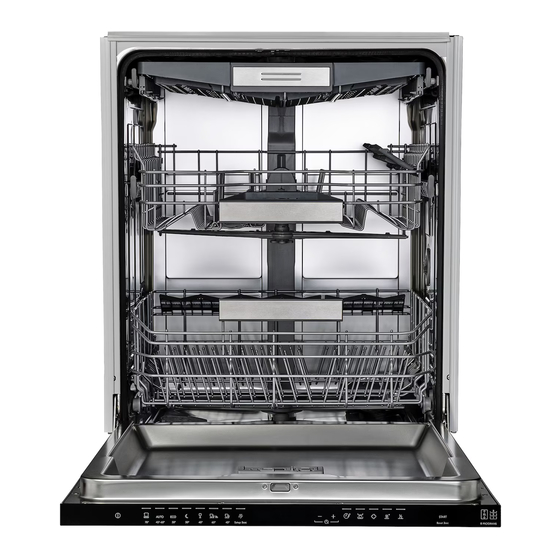IKEA DISKAD Manual - Página 13
Procurar online ou descarregar pdf Manual para Máquina de lavar loiça IKEA DISKAD. IKEA DISKAD 45 páginas.
Também para IKEA DISKAD: Manual de instruções (50 páginas), Manual (36 páginas), Manual (16 páginas), Manual (37 páginas)

ENGLISH
Drying (depending on appliance specifica-
tions)
The appliance is equipped with a container which has a min-
eral inside. This mineral can store moisture and heat energy
and then release the energy again. Drying this way allows
you to save energy.
During dishwashing, heat energy is used to heat up the
washing water and dry the mineral.
During the drying phase, moisture from the interior of the
dishwasher is stored in the mineral and heat energy is re-
leased. The heat energy is blown out into the interior of the
dishwasher with dry air. This speeds up and improves dry-
ing.
This drying method saves a great deal of energy.
Cleaning and servicing
Cleaning and servicing
To keep your appliance working efficiently for a long time, it
Cleaning and servicing
is important to clean and maintain it carefully.
CAUTION
Risk of injury!
Risk of injury during maintenance work If the appliance is
●
connected to the power supply during maintenance work,
this may result in a risk of injury.
Before performing maintenance work, ensure that the ap-
●
pliance is disconnected from the power supply.
Cleaning the tub
WARNING
Risk of harm to health!
Using detergents containing chlorine may result in harm
●
to health.
Never use detergents containing chlorine.
●
-
→ Fig.
2
7
Self-cleaning interior
To remove deposits, the appliance self-cleans the interior at
regular intervals.
The programme sequence is automatically adjusted for self-
cleaning, e.g. the cleaning temperature is briefly increased.
Consumption values, e.g. water and electricity, may also in-
crease.
If the interior is no longer self-cleaned adequately and de-
posits occur, see this information:
→ "Cleaning the tub", Page 13.
Transportation, storage and disposal
Transportation, storage and disposal
Transportation, storage and disposal
Removing the appliance
Disconnect the appliance from the power supply.
1.
Turn off the water tap.
2.
Detach the drainage connection.
3.
To download the full document, visit www.ikea.com
Note: To avoid impairing the drying performance, do not
position items of crockery directly in front of the intake
opening or the blow-out opening of the container.
Do not position heat-sensitive items of crockery directly in
front of the blow-out opening of the container.
AquaSensor
The AquaSensor is an optical measuring device (light barrier)
which measures the turbidity of the washing water. You can
save water with the AquaSensor.
Use of the AquaSensor depends on the programme. If the
soiling level is low, the washing water is used in the next
wash cycle, allowing water consumption to be reduced by
3-6 litres. If the soiling level is higher, the washing water is
drained off and replaced with fresh water. In the automatic
programmes the temperature and running time are addi-
tionally adjusted to the level of soiling.
Cleaning products
Only use suitable cleaning products to clean your appliance.
→ "Safe use", Page 12
Tips on appliance care
Note: If the appliance is not going to be used for a while,
leave the appliance door slightly ajar.
→ Fig.
8
Filter system
The filter system removes coarse soiling from the dishwash-
ing cycle.
→ Fig.
9
Micro filter
1
Fine filter
2
Coarse filter
3
Cleaning filters
Soiling in the dishwashing water may block the filters.
Note: After each wash, check the filters for residue. Check
that no foreign objects fall into the sump during dishwash-
ing.
-
→ Fig.
10
13
Cleaning spray arms
Limescale and soiling in the dishwashing water may block
the nozzles and bearings on the spray arms. Clean the spray
arms regularly.
-
→ Fig.
14
18
Detach the drinking water connection.
4.
Loosen any screws fastening the appliance to cabinet
5.
parts.
Remove the base panel if fitted.
6.
Pull the appliance out carefully, along with the hose be-
7.
hind it.
13
